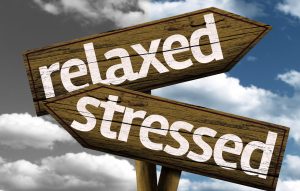
One of the major changes that occurs when a person suffers from chronic stress is too much adrenaline and cortisol in the system. Now research has discovered a direct link between adrenaline and Breast Cancer.
Adrenaline and the Fight or Flight Response
Adrenaline, also known as epinephrine, is a hormone that is produced by the adrenal glands.
More than likely, you have already heard of the “fight or flight” response, also known as the stress response. The stress response happens automatically and is part of the Sympathetic Nervous System. The body goes into this mode in response to any kind of threat. It could be a stranger walking towards you in a dark alley, a wild animal chasing you, a fight with your spouse or a looming deadline.
Whatever the cause, the response is the same. In stress response mode, the body pushes out cortisol and adrenaline at a very high rate. It will divert blood flow and energy from regulation processes like digestion and towards the extremities (more energy for running!).
This redirection of energy makes sense if you actually need to run from that wild animal. However, staying in the stress response over the long term is one of the main factors for the development of chronic diseases, including Breast Cancer. (To watch a FREE webinar about the 7 steps for beating breast cancer naturally, Click Here)
Progesterone and Adrenal Imbalance
As it turns out, the adrenals are also the production center for progesterone, a vital hormone for the reproductive system and also a strong cancer-protector. A joint study sponsored in part by Cambridge University found that progesterone can inhibit estrogen-instigated cancer cell growth as well as keep your reproduction system on track.
When a person is chronically “stressed out,” the body turns down progesterone production. Low progesterone in the body can mean growth may be stunted in a developing girl or it may be difficult to

conceive a baby for a grown woman. Other side effects of low progesterone levels include abnormal menstrual periods, missed periods and heavier cramping than normal. Of course, another major consequence of low progesterone levels is a higher risk for reproductive cancers. According to research conducted by the late Dr. John Lee (author of What Your Doctor May Not Tell You About Breast Cancer), adequate amounts of progesterone in the system as well as functioning cellular receptors for
progesterone are key ingredients for slowing down ER+ breast cancer.
The Adrenaline-Cancer Connection
Sometimes stress caused by a hectic lifestyle or unresolved trauma goes on for years. It is in this
situation that the risk for cancer is highest. In fact, some researchers have now found the direct cause for this connection.
A meta-analysis conducted by MD Anderson Cancer Center, UCLA and the United States National Cancer Institute found that the sympathetic nervous system and adrenaline, as well as other noradrenaline-stimulating mechanisms, are able to alter genetic codes in response to stress.
This is big news, because of the laundry list of other effects these changes may cause:
-an inhibition of cancer cell death
-inhibition of DNA repair
-stimulation of cancer cells’ ability to create blood flow supply (angiogenesis)
-the creation of new cancer stem cells in a process called “epithelial-mesenchymal transition.”
-a reduction in Natural Killer cells, whose job it is to seek out cancer cells and destroy them; and finally,
-a significant increase in inflammation and inflammatory markers.
What You Can Do To Balance Your Stress Hormones
By employing these 4 steps, you can get your adrenaline as well as cortisol levels in proper balance.
#1 Reduce Stress! This is the most important step you can take to balance your stress responses and restore adequate
levels of both reserve adrenaline and progesterone. Meditation, walking or having a good “belly laugh” are just a few examples. Simply making it a point to “slow it down” several times throughout the day can be very effective as well.
#2 Get enough sleep. I cannot over emphasize the powerful advantages that come with a night of deep restorative sleep. According to experts, cortisol will surge after 11 pm, so if you want to reinvigorate your adrenals, be sure to get to bed by 10 PM.
#3 Go for adrenal-supporting essential nutrients. Nutrients that are especially important for restoring the adrenals include B12, B6, magnesium, zinc, iodine, and vitamin D.
There is definitely a connection between adrenal imbalance and the development of cancer. What’s more, adrenal depletion can leave you feeling just plain burnt out and with not much motivation or energy to do much of anything.
Roughly 80% of all Americans may have some version of adrenal fatigue. Don’t be a statistic. Reduce stress, get quality sleep and restore your adrenals. You CAN get your life back and prevent breast cancer as well!
Dr. Veronique Desaulniers (“Dr V”) is the founder of Breast Cancer Conqueror.com and The 7 Essentials System®. This step-by-step guide empowers you with knowledge so you Never Have to Fear Breast Cancer Again! To watch a FREE webinar about the 7 steps for beating breast cancer naturally, Click Here

I’ve had breast cancer twice now. 2005 – tubular, stage one with lumpectomy and radiation. Fast forward to 2019 – eight years on bioidentical HRT, stage one invasive ductal carcinoma HER2- with positive receptors to estrogen and progesterone. Hormones are tanked at zero after stopping at diagnosis. Double mastectomy with reconstruction underway. No f/u treatment needed. However, emotional state beyond fragile and crying nonstop with deep depression. Do you feel it is safe to return to BHT to feel better or is it too risky. Would love your opinion. I feel horrible.
Hello Cathy! Thank you for reaching out with this question- this is certainly a topic that many women are interested in! I think you personally would benefit from reaching out to Dr. Lindsey Berkson. She has lots of research that proves that Bioidentical HRT does NOT cause cancer but can be very protective. Here is her website: https://drlindseyberkson.com/
I hope this helps!